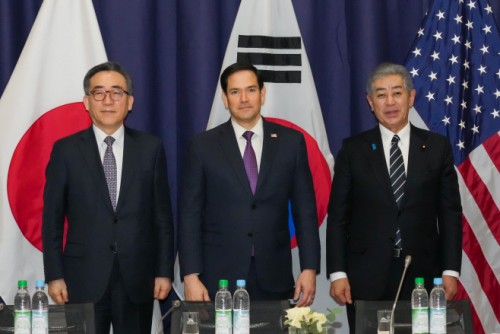 |
| From left, South Korean Foreign Minister Cho Tae-yul, U.S. Secretary of State Marco Rubio and Japanese Foreign Minister Iwaya Takeshi pose during a trilateral meeting on the sidelines of the Munich Security Conference in Germany, on Feb. 15, 2025./ Courtesy of Ministry of Foreign Affairs |
Washington correspondent Ha Man-joo
The Foreign Ministers of South Korea, the United States, and Japan met Saturday in Munich, Germany, to reaffirm their trilateral cooperation on regional and Indo-Pacific issues .
South Korean Foreign Minister Cho Tae-yul, U.S. Secretary of State Marco Rubio, and Japanese Foreign Minister Iwaya Takeshi held a 45-minute meeting on the sidelines of the Munich Security Conference. This meeting marked the first trilateral foreign ministers' meeting since the inauguration of the Donald Trump administration last month. The ministers agreed to continue their cooperation on regional and Indo-Pacific issues.
A joint statement released after the meeting emphasized the unwavering partnership among the three countries. The statement noted that the ministers reaffirmed their commitment to the security, prosperity, and stability of the Indo-Pacific region. They also pledged to take resolute actions to counter threats, enhance economic resilience, and promote shared interests.
The statement also highlighted the ministers' firm commitment to the complete denuclearization of North Korea. The three countries agreed to strengthen sanctions against North Korea and to respond decisively to North Korea's sanctions violations and evasion activities.
Additionally, the G7 foreign ministers, including those from the United States, Japan, the United Kingdom, Canada, Germany, France, and Italy, issued a statement demanding that North Korea abandon all nuclear weapons, existing nuclear programs, and other weapons of mass destruction (WMD) and ballistic missile programs in a complete, verifiable, and irreversible manner (CVID).
However, the trilateral meeting did not focus on discussing the Trump administration's tariff policies.
The joint statement also reaffirmed the ministers' commitment to addressing economic coercion and unfair trade practices, contributing to a free and fair global economic order. The ministers pledged to strengthen economic partnerships that benefit the sincere citizens and businesses of their respective countries.
#South Korea #US #Japan #commitment #denuclearization
Copyright by Asiatoday
Most Read
-
1
-
2
-
3
-
4
-
5
-
6
-
7





















